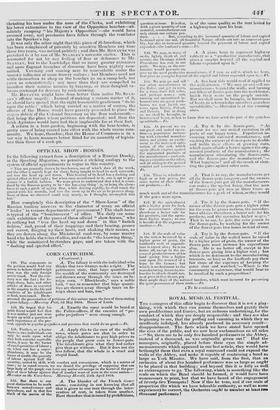CORN CATEC IllS M.
(Continued.) to mix up with a question of such importance US the pre- sent, appeals to popular prejudices and passions that could do no good.—Ib.
151. Further, as a barter between two individuals can only be made upon what they both consider equitable terms, it may be the barter of equal quantities of labour ; or, when one has a super- abundance, it may be the barter of double the quantity of labour against half the quantity, uMted by skill, with comfort and convenience, which is a matter of taste ; so in sound reason, we are denied the privilege of supposing that one large body of the people can have any undue advantage in the bartei of the pro- duce of their labour against that of another mass of men in tile same nation.— Mercator on Me Corn-laws. Morning Herald, :Kith April 1834. 155. At present we see one great and united opera- tion—a population increas- ing with extended manufac- tures, and giving an excite- ment to the inernsed culti- vation of the soil, which again affords a hurter against the augmented products of the manufacturer —each act- ing as a stimulus to the other, and all adding to the general comfort and convenience. — /b.
153. There is, whether at high or at low prices, the same barter of their differ- ent products.— I b.
157. If time agriculturist gets a higher price for food, the manufacturer obtains therefrom a better sale for his products, and the opera- tives higher wages ; no one is benefited at the expense of another.— lb.
A. The fallacy is with the individual who thinks that two wrongs make a right. The petitioners state, that large quantities of the wealth of the community are destroyed and thrown away through the taxes on fo- reign corn. "'Blockheads," says a noble lord, " not to remember that large quanti- ties are thrown away through taxes on fo- reign shoes and hats, too."
15.0. He hoped that his A. Exactly the same would be heard at !wide friend would feel that the Police-offices, if the enemies of "p0- St was neither just nor wise pular prejudices" were strong enough.
A. Apply this to the case of the walled town, whose gates are shut in order to oblige the inhabitants to give high prices to the people that grow corn in flower-pots. The inhabitants give what they had rather give than go without. But it does not the less follow, that the whole is a cruel and stupid fraud.
great distinction to be made /aisles, consisting in not knowing that all between manufactures and that is given to one man through the inter- agriculture, and in that lies vention of rent„ m is taken from another. much of the merit* et. the Rent therefore that is raised by prohibitions,
a highwayman upon his beat.
A. A pious hoax to represent highway robbery as a " productive matittflueure, that gives a surplus _quiet all the capital and labour expended upon it."
134. We may go and sell' A. See how this would read if applied to the walled town. " We tney go and sell our manufartures beyond the walls, and turtling our fillers of flower-pots into the workhouse, lavish their rents on the people outside. But we shell soon be brought, in bitterness of heart, to arkilowledge ourselves graceless spendthrifts."—Mercator is of the elm ll i ll g ones.
A. Try it by the dower.pots. " At present we see one united operation in all parts of our happy town. Population in- creasing with extended manufactures, and exciting the owners of flower-pots to double and treble their efforts at growing corn, which again affords a barter against the aug- mented products of the manufileturer ; the manufacturer stimulating the flower-pots, and the flowerpots the manufacturer."— What happiness ! and all the result of shut- ting the gates against other corn.
A. Try it by the flowerpots. " If the owner of the flower-pots gets is higher price for the corn he grows in them, the manufac- turer obtains therefrom a better sale for his products, and the operative higher wages." That is to say, he gets the corn grown in the flower-pots, by working for the owner of the flower-pots two hours instead of one.
15,tt. If the sal of value in the tertian be rais2d by a higher price of grain, the landlord's scale of expendi- ture is raised also ; he is no better off, except in the in- creased productiveness of his land giving him a higher rent upon the renewal of a lease to the fanner ; but which is no detriment to the manufacturing interests, un- less the laadloi ds should nut, as at present they do not, pay their ample share of the national bunions, which were incurred for preserving the quiet possession of these rents.—/b. A. Try it by the flower-pots. "If the scale of value in the walled town be raised by a higher price of grain, the owner of the flower-pots must increase his expenditure also. He is no better off, except in his flower-pots giving him a higher rent ; but which is no detriment to the manufireturing interests, so long as the landlords pay their fair share of' the expenses of keeping the gates shut and watched."—Where is the community in existence, that would bear to be insulted by such a proposition ?
n be continued.)


















 Previous page
Previous page